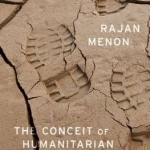The Conceit of Humanitarian Intervention
BookThis item doesn’t have any media yet
2016 | History & Politics
The post-Cold War period has witnessed a substantial increase in armed humanitarian interventions-the use of military force by one or more states, acting with or without the imprimatur of the United Nations, to stop mass atrocities in another state, generally without its consent and thus without regard to its sovereignty. The increase has three sources: the emergence of the United States as a peerless power; Western states' embrace and propagation of universal human rights norms; and the international human rights movement's dogged and effective lobbying, using national and international forums, in support of the project. The campaigns in Bosnia, Kosovo, and Libya demonstrate the salience humanitarian intervention has now acquired in world politics. In this new era, states' sovereign immunity is being reevaluated and intervention based on universal human rights principles has become common. Rajan Menon's The Conceit of Humanitarian Intervention presents a trenchant challenge to the conventio
Related Items:
| Published by | Oxford University Press Inc |
| Edition | Unknown |
| ISBN | 9780199384877 |
| Language | N/A |
Images And Data Courtesy Of: Oxford University Press Inc.
This content (including text, images, videos and other media) is published and used in accordance
with Fair Use.
